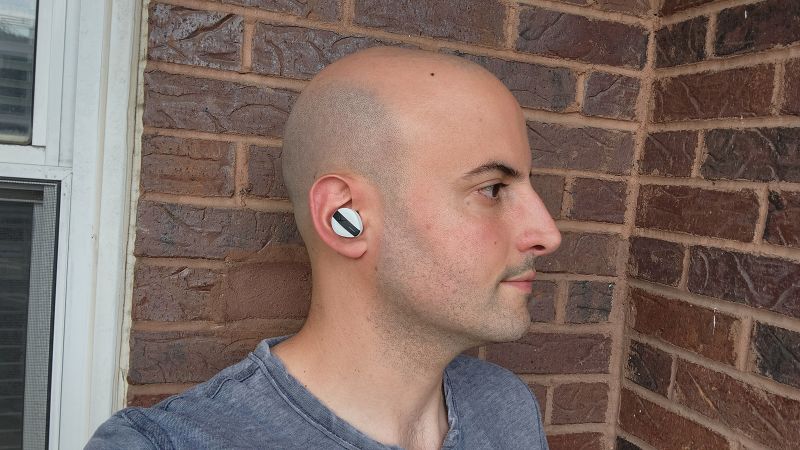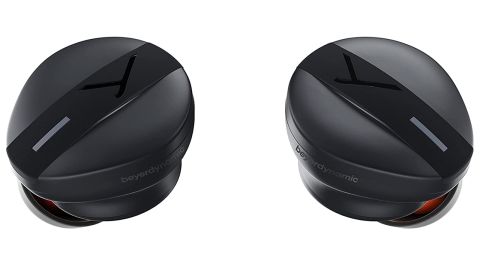Beyerdynamic has long been a household name in the audiophile world, best known for its popular, premium over-ear headphones. So what happens when the company distills its signature sound prowess into a pair of true wireless earbuds? You get the Free Byrd: A $249 pair of buds with dependable active noise cancellation, superb battery life and excellent sound that’s worthy of the Beyerdynamic name.
But while Beyerdynamic’s first-ever true wireless earbuds have a lot going for them, they’re held back by frustrating controls and a bulky design that might not be for everyone. Before you make the big $249 splurge, here’s what I think after nearly a month of using these buds during work, play, travel and everything in-between.
A great pick for audiophiles who are willing to splurge, the Beyerdynamic Free Byrd offer some of the best sound quality and battery life you can find in a pair of premium earbuds. However, those turned off by their bulky design and inconsistent touch controls should look at the Sony WF-1000XM4 or cheaper options like the AirPods Pro.
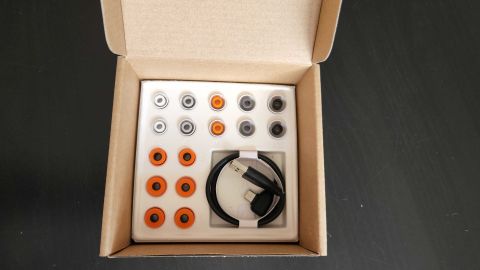
The second I opened the box, I could see how the Beyerdynamic Free Byrd set themselves apart from any other pair of wireless earbuds I’ve tested. That’s because these buds ship with a whopping 8 pairs of ear tips — that includes five silicone tips ranging from extra small to extra large, as well as foam options in small, medium and large for those who need something more sweat-friendly while working out.
That’s an unheard of level of physical customization — most buds include three or four sets of tips — and for folks that usually have a hard time finding the right fit (or want to be able to swap out ear tips once they get sweaty), could make the Free Byrd worth the price of admission alone. Once I settled on the standard large tips, I was treated to a lightweight, secure fit that made it easy to completely forget I was wearing the buds during long bouts of working, walking and traveling. Well, until I looked in the mirror or tried to lay down, but more on that later.
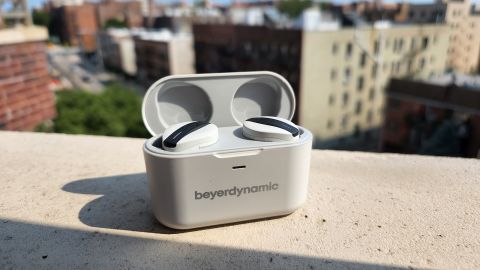
On top of feeling great in-ear, the Free Byrd are some of the longest-lasting earbuds I’ve ever used. I got through close to a whole week of listening without even having to charge the case, and that’s including long work hours, train rides, dog walks and even a few flights — all with active noise cancellation activated most of the time. I was truly staggered by the Free Byrd’s endurance, as even some of my favorite buds (including the Beats Fit Pro and Sony LinkBuds S) required me to plug in the case after three or four days of regular use.
Beyerdynamic’s buds alone are rated for up to 11 hours of runtime, with an additional 19 hours from the case, and my testing lines up with that — if not exceeds it. That puts them roughly in line with the 12 hours and 30 minutes we got from the similarly high-end Sony WF-1000XM4 (our current best noise-canceling earbuds pick), and well ahead of the 5 hours and 30 minutes we eked out of the Bose QuietComfort buds.
Great, customizable audio and strong noise cancellation
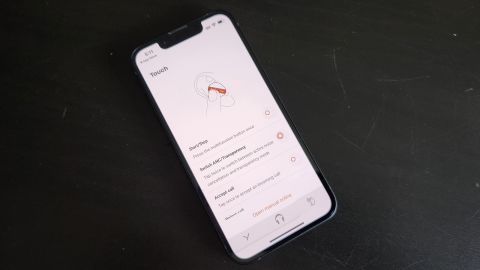
Beyerdynamic is one of the biggest names in the high-end audio space, so it’s no surprise that their first true wireless earbuds sound great. The crunchy guitars, rollicking bass and snappy drums of my favorite punk songs all sounded bright and loud without overpowering one another, and I could clearly make out the dueling vocal harmonies in Phoebe Bridgers’ ethereal electronic ballad “Sidelines.” I was happy to use the Free Byrd as my main music headphones for close to a month, and found them to offer fuller overall sound and deeper bass than the more mainstream buds I usually use like the Beats Fit Pro and LinkBuds S.
I found the Free Byrd to sound fantastic out of the box, but you can tweak them to your liking using the MIY companion app for iOS or Android. The app lets you create a personalized sound profile by completing a quick audio test, which consists of a few minutes of holding a virtual button every time you hear a beep. Once the app has gauged your hearing style, you can use a slider to decide how much of your personalized profile you want to use versus the earbuds’ default settings. I didn’t notice a big difference in quality after doing this test, but it’s a nice extra for those with a super discerning ear.
The MIY app also has a handful of sound presets, including bass boost for thumping low-end and a speech setting for amplifying voices during podcasts. These all work as advertised, though certain settings like “v-shape” and “brilliance” might not mean much to non-audiophiles. Either way, the Free Byrd offer excellent audio quality even before you make any tweaks, and these equalizer settings are there for folks who like tinkering. The app even lets you dig into stats such as your total time spent listening to music and taking calls, which was handy for writing this very review.
A $249 pair of earbuds better have good active noise cancellation, and fortunately, that’s absolutely the case here. The Free Byrd did a good job dampening everything from my overworked air conditioner to the loud clangs of construction outside my apartment. I found Beyerdynamic’s ANC to be a bit stronger than Beats’, though Sony’s LinkBuds S were a little more suppressive than both when I tested them against my noisy New York street. The Free Byrd’s Transparency mode is likewise reliable, amplifying all of the aforementioned sounds when I needed to stay alert while walking my dog (though it also made her barking sound extra harsh). I just wish switching between the two modes was a little easier, but more on that later.
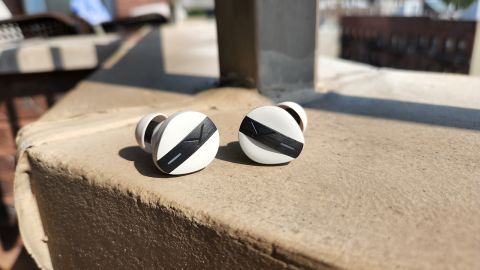
As great as the Free Byrd feel and sound, their unreliable touch controls are frustrating enough to make me want to switch to something else. While Beyerdynamic’s buds offer all of the requisite control options — such as pausing playback, skipping songs and adjusting volume — they’re stuck behind inconsistent touch inputs and a few odd gestures that you can’t customize. It often took multiple attempts for me to simply pause a song with a single tap, and double-tapping to switch between noise canceling and Transparency mode didn’t always work well either. And while each tap is met with an audible beep to let you know which control you’re about to activate, those sounds often got buried by my music.
My other big issue is that some of the Free Byrd’s controls just don’t feel natural. I’ve grown accustomed to using one tap to pause playback and two taps to skip songs on most earbuds, but these buds use a strange, unintuitive pattern of pause/play (one tap), noise control (two taps) and skip song (three taps). This wouldn’t be as big a deal if you could customize the controls via the MIY companion app, but unfortunately, you cannot. Perhaps I’ve been spoiled by the accurate physical controls on my Beats earbuds, but even recent touch-based models such as the Sony LinkBuds S are far more reliable.
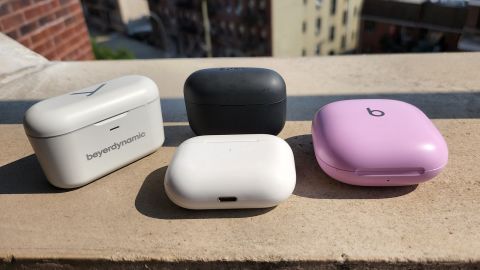
This may be a matter of personal preference, but I don’t find the Free Byrd to be very pleasing aesthetically. While some music fans may appreciate their guitar pick-inspired shape, these buds are some of the bulkiest I’ve ever seen. I don’t love the way their thick exterior juts out of my ears when I’m out and about, and even if you take my vanity out of the equation, their large design made them uncomfortable to wear when I used them to listen to some sleep sounds while laying down (to be fair, there are dedicated sleep headphones for that, like our top-rated Bose Sleepbuds 2). The Free Byrd buds aren’t unique in this regard — the Bose QuietComfort earbuds are similarly bulky but offer top-notch ANC in return — so you’ll have to weigh whether you care more about style or performance.
The Free Byrd’s case also takes up a good amount of pocket space (and is extremely prone to smudges and scuffs), and while they’re comfortable to wear overall, each 2.1-ounce bud feels noticeably heavier than the Beats Fit Pro I typically use.
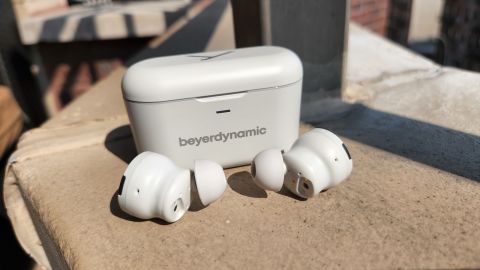
When it comes to sound quality, battery life and active noise cancellation, the Beyerdynamic Free Byrd are worth their hefty $249 price tag. They’re some of the best-sounding wireless earbuds you can buy, and they last longer than nearly all of the competition. Their handy companion app and plethora of swappable ear tips certainly don’t hurt either.
However, the Free Byrd’s bulky design and unreliable touch controls hold them back from being the best wireless earbuds for my daily use. However, if you care more about great performance than having a stylish pair of buds in your ears, the Free Byrd could be an excellent fit for you — especially since they’re cheaper and longer-lasting than the similarly chunky Bose QuietComfort buds.
But as compelling as a package as the Free Byrd are, I’d still point most people to alternatives like the AirPods Pro, Beats Fit Pro and LinkBuds S, which are sleeker, have more dependable controls, and are typically way cheaper. And if you do want to splurge, the $279 Sony WF-1000XM4 remain our premium ANC pick thanks to their deeper sound customization options and superior design.
